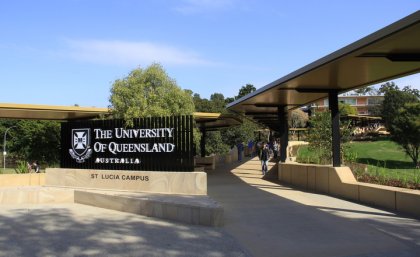The Federal Government has announced $12.8 million worth of Australian Research Council (ARC) Linkage grants for 26 UQ research projects, the largest investment for any Australian university.
 Importantly, partner contributions (including both cash and in-kind) took the overall total investment to $36.9 million.
Importantly, partner contributions (including both cash and in-kind) took the overall total investment to $36.9 million.
UQ Vice-Chancellor and President Professor Peter Høj AC said the result was particularly pleasing as it demonstrated the relevance of UQ research to industry partners and helped bridge the gap between research and its application.
“ARC Linkage grants provide an opportunity for researchers to work with industry, community groups and government agencies to develop research projects that genuinely make a difference for Australian society,” Professor Høj said.
Researchers from UQ’s Faculty of Health and Behavioural Sciences were successful in applications for four projects.
School of Nursing, Midwifery and Social Work
Lead co-investigator: Professor Karen Healy
Project title: Enhancing children's journeys in out-of-home care: a multi-perspective study
This study aims to improve the experiences of, and outcomes for, Indigenous and non-Indigenous children in Out-of-Home Care (OOHC). Drawing on detailed longitudinal, qualitative interview data from children in out-of-home-care, their birth families and carers across geographically diverse sites in Queensland, the study will build a rich understanding of their experiences. Outcomes include improved knowledge of how to strengthen children's connections to culture and caring relationships during OOHC and how these connections shape children's well-being. Benefits include improved outcomes for children and better practice to achieve positive social, cultural and emotional well-being for those involved OOHC especially in Indigenous communities.
ARC funding: $778,000
Project partners: The Benevolent Society; Churches of Christ in Queensland; UnitingCare; Life Without Barriers; Aboriginial and Torres Strait Islander Community Health Service Brisbane; Queensland Aboriginal and Torres Strait Islander Child Protection Peak Limited; Department of Child Safety.
School of Psychology
Lead co-investigator: Professor Andrew Neal
Project: Designing work roles for crew operating multiple unmanned aircraft
The aim of this project is to identify how work roles should be designed for crew operating multiple unmanned aircraft (UA). Industry expects that the introduction of higher levels of automation in next-generation UA systems will reduce the operational costs associated with UA by enabling human crews to simultaneously manage multiple aircraft. The current project examines the safety and effectiveness of different types of work designs for these systems. The primary outcome will be a set of recommendations regarding the design of work roles for the crew of next-generation UA systems. Expected benefits include improvements in safety and cost-effectiveness of next-generation UA systems.
ARC funding: $346,899
Project partners: Griffith University; Boeing Research and Technology Australia
Lead co-investigator: Professor Julie Henry
Project: Reducing social frailty in late adulthood
Social frailty is one of the most troubling and potentially devastating threats to healthy adult ageing, and refers broadly to low social engagement status. This project aims to test how age-related changes in the abilities that allow us to perceive, interpret and process social information drive resilience and risk for this important threat to successful ageing, and then leverage these data to create a training tool that directly targets those abilities identified as being most strongly linked to social frailty. Enhancing older adults' resilience to social frailty should generate significant and far-reaching benefits, including greater independence of ageing Australians, and reduced burden on health and welfare support infrastructure.
ARC funding: $461,088
Project partners: Mater Research Ltd; Mater Misericordiae Ltd
Queensland Alliance for Environmental Health Sciences
Lead co-investigator: Professor Jochen Mueller
Project: Understanding Australia by analysing wastewater during the Census 2021
This project aims to utilise the Australian Census 2021, a unique opportunity to link exposure to chemical and biological hazards with catchment socio-demographic data via systematic wastewater analysis. The project is expected to advance our capabilities to identify emerging hazards and understand factors that affect spatiotemporal trends in hazards across Australia. Moreover, in a world first, the project aims to assess chemical fate on a national level by linking sales/use with fate and release from wastewater treatment plants and assess treatment efficiency at >100 plants around Australia. The project expects to provide insight for government, wastewater managers and industry into hazards that may affect environmental and human health.
ARC funding: $563,412
Project partners: University of South Australia; Queensland Health; Melbourne Water Corporation; Queensland Urban Utilities; Environment Protection Authority Victoria; Unilever Research And Development; Healthy Land And Water Ltd; Department Of Environment And Science; Stockholm University, Sweden; University Of Antwerp, Belgium; CSIRO; Norwegian Institute For Water Research; Swiss Federal Institute Of Aquatic Science And Technology; Australian Criminal Intelligence Commission; Water Research Australia Limited.
Other successful UQ projects include maximising pineapple production for Queensland farmers, enabling next-generation rechargeable aluminium-ion batteries, monitoring how alcohol promotion is targeting young Australians on social media, and developing eco-friendly pesticides for crop protection.
In this round of ARC Linkage Projects, $78.1 million was provided to 175 new research projects at Australian universities.
A full list of ARC Linkage Projects can be found here.
A version of this story first appeared on UQ News.



